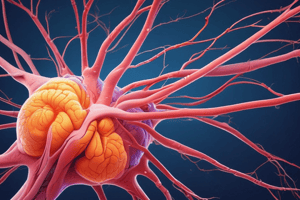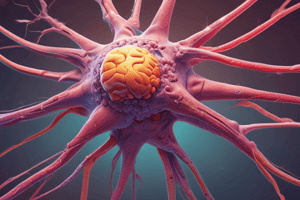Podcast
Questions and Answers
In comparison to the sympathetic division, the parasympathetic division __________.
In comparison to the sympathetic division, the parasympathetic division __________.
has ganglia closer to or inside the target organs
Sympathetic preganglionic neurons arise from:
Sympathetic preganglionic neurons arise from:
- The sacral spinal cord segments
- The cervical spinal cord segments
- All of the thoracic spinal cord segments (correct)
- The lumbar spinal cord segments
Sympathetic preganglionic neurons synapse with postganglionic neurons in all of the following EXCEPT:
Sympathetic preganglionic neurons synapse with postganglionic neurons in all of the following EXCEPT:
- Collateral ganglia
- Sympathetic chain ganglia
- Terminal ganglia (correct)
- Paravertebral ganglia
Preganglionic fibers headed for the adrenal medulla travel in the __________.
Preganglionic fibers headed for the adrenal medulla travel in the __________.
If Michael experiences a frightening situation that causes the stimulation of his sympathetic nervous system, which of the following is NOT likely to occur?
If Michael experiences a frightening situation that causes the stimulation of his sympathetic nervous system, which of the following is NOT likely to occur?
The suprarenal medullae release which of the following neurotransmitters?
The suprarenal medullae release which of the following neurotransmitters?
How would the use of a beta blocker affect an individual's heart rate?
How would the use of a beta blocker affect an individual's heart rate?
Which neurotransmitter does the sympathetic division use primarily to excite target organs?
Which neurotransmitter does the sympathetic division use primarily to excite target organs?
Which of the following is NOT a possible pathway for sympathetic neurons leaving the spinal cord and entering a sympathetic chain ganglion?
Which of the following is NOT a possible pathway for sympathetic neurons leaving the spinal cord and entering a sympathetic chain ganglion?
Which of the following nerves has parasympathetic fibers?
Which of the following nerves has parasympathetic fibers?
Parasympathetic postganglionic neurons are generally shorter than preganglionic neurons.
Parasympathetic postganglionic neurons are generally shorter than preganglionic neurons.
Approximately 75 percent of all parasympathetic preganglionic nerves travel through the __________.
Approximately 75 percent of all parasympathetic preganglionic nerves travel through the __________.
Which of the following is correctly matched?
Which of the following is correctly matched?
The cell bodies for preganglionic parasympathetic neurons that innervate the parotic gland are found in __________.
The cell bodies for preganglionic parasympathetic neurons that innervate the parotic gland are found in __________.
Cell bodies for parasympathetic postganglionic neurons can be found in __________.
Cell bodies for parasympathetic postganglionic neurons can be found in __________.
Why is the sympathetic nervous system known as the 'fight or flight' system?
Why is the sympathetic nervous system known as the 'fight or flight' system?
Why is the parasympathetic nervous system (PNS) known as the 'rest and repose' system?
Why is the parasympathetic nervous system (PNS) known as the 'rest and repose' system?
What do the sympathetic and parasympathetic nervous systems have in common?
What do the sympathetic and parasympathetic nervous systems have in common?
Autonomic neurons leaving the brainstem belong to __________.
Autonomic neurons leaving the brainstem belong to __________.
The intramural ganglia of the parasympathetic division can be found __________.
The intramural ganglia of the parasympathetic division can be found __________.
Stimulation of the parasympathetic division could cause which of the following?
Stimulation of the parasympathetic division could cause which of the following?
In which of the following does dual innervation play a major role?
In which of the following does dual innervation play a major role?
What happens when both sympathetic and parasympathetic neurons innervate a target organ?
What happens when both sympathetic and parasympathetic neurons innervate a target organ?
In terms of autonomic levels of control, what is the main location for the control of the sympathetic and parasympathetic divisions?
In terms of autonomic levels of control, what is the main location for the control of the sympathetic and parasympathetic divisions?
Which of the following is NOT a function of the sympathetic division of the ANS?
Which of the following is NOT a function of the sympathetic division of the ANS?
Which of the following does NOT consist of a bilaterally arranged pair of structures?
Which of the following does NOT consist of a bilaterally arranged pair of structures?
The __________ nerve provides the greatest amount of outflow from the parasympathetic division.
The __________ nerve provides the greatest amount of outflow from the parasympathetic division.
Which statement is FALSE regarding sympathetic neurotransmitter release?
Which statement is FALSE regarding sympathetic neurotransmitter release?
Flashcards are hidden until you start studying
Study Notes
Nervous System Divisions
- Parasympathetic division has ganglia positioned closer to or within target organs.
- Sympathetic preganglionic neurons originate from all thoracic spinal cord segments.
- Sympathetic preganglionic neurons do not synapse in terminal ganglia.
- Preganglionic fibers targeting the adrenal medulla utilize the greater splanchnic nerve.
Sympathetic Nervous System Responses
- In a frightful situation, sympathetic stimulation would likely not result in increased smooth muscle activity in the GI tract.
- The adrenal medullae primarily release adrenaline (epinephrine).
- Beta blockers can slow heart rate by inhibiting sympathetic stimulation.
- Norepinephrine is the primary neurotransmitter for excitatory responses in target organs.
Sympathetic Neuron Pathways
- Sympathetic neurons cannot enter the dorsal root of the spinal nerve after passing through the chain ganglion.
- Facial nerve is an example of a nerve containing parasympathetic fibers.
Parasympathetic Nervous System Characteristics
- Parasympathetic postganglionic neurons are generally shorter than preganglionic neurons.
- Around 75% of parasympathetic preganglionic fibers travel via the vagus nerve.
- Pterygopalatine ganglion innervates lacrimal glands.
- Preganglionic parasympathetic neurons for the parotid gland reside in nuclei of the brainstem.
Ganglia and Control
- Parasympathetic postganglionic neuron cell bodies are located in intramural ganglia found within target organ tissues.
- Parasympathetic division promotes increased GI tract smooth muscle contraction.
Dual Innervation and Control Centers
- Dual innervation, where both sympathetic and parasympathetic fibers innervate the same organ, primarily affects the small intestine and results in antagonistic effects.
- Main control center for the sympathetic and parasympathetic divisions is located in the hypothalamus.
Functions of Divisions
- Sympathetic division is characterized by responses that do not prioritize energy conservation.
- Collateral ganglia do not consist of bilaterally arranged pairs, as opposed to other ganglion types.
Autonomic Outflow and Neurotransmitters
- Vagus nerve is the primary conduit for parasympathetic outflow.
- Sympathetic neurotransmitter release involves varicosities that are not primarily for neurotransmitter production, contradicting common beliefs.
Studying That Suits You
Use AI to generate personalized quizzes and flashcards to suit your learning preferences.




